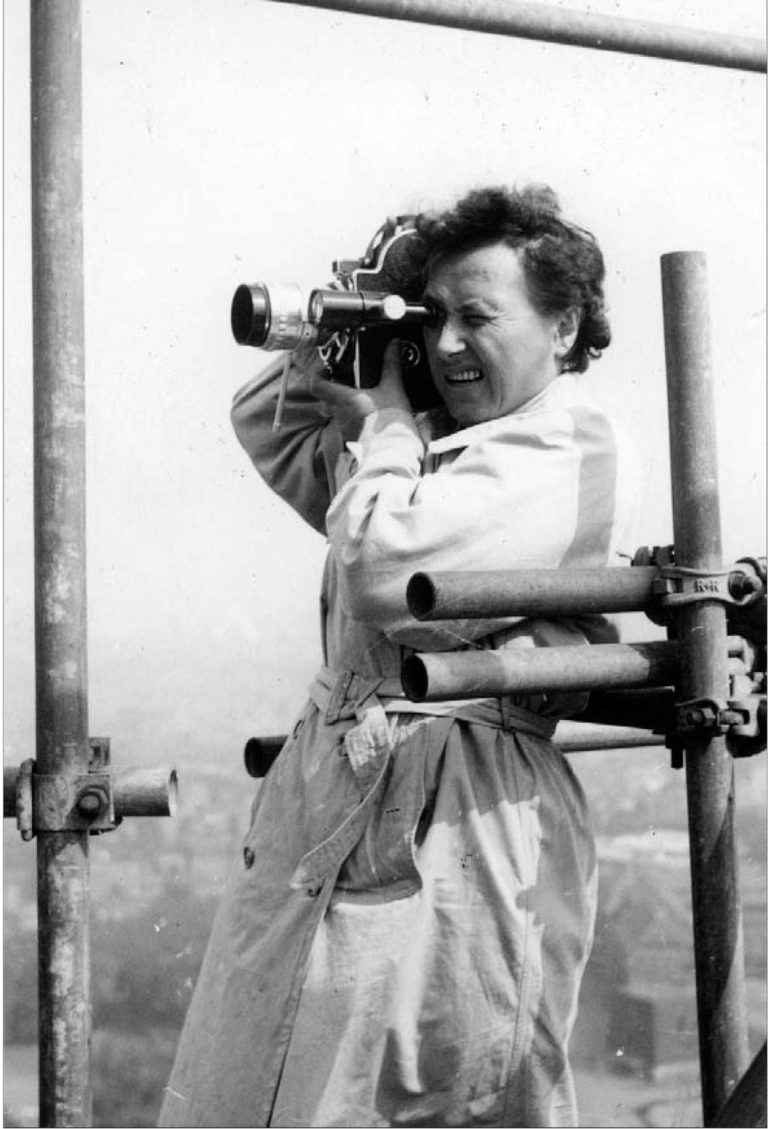Introducing Dortmund – Elisabeth Wilms

»This was completely new to me, that you could make films yourself. Before then I had rarely taken photographs – and, if at all, with insignificant results. From that hour onwards, I was like in a fever. I had the feeling that I was getting somewhere near the fulfilment of my most secret wishes.«
– Elisabeth Wilms
Elisabeth Wilms came to the world of film by coincidence. It was in 1941, in the middle of the war, that she watched am 8mm film at a woman neighbour’s and was at once enthralled. Having procured some empty film and a camera though business connections, she taught herself the necessary skills and also followed the lead set by colleagues at the Dortmund Cine Club, which she joined in 1943. With her film prowess easily up to any professional standard, she clearly had an exceptional talent. Yet she considered herself an amateur – a baker’s wife who happened to make films. As the daughter of a master butcher and sausage manufacturer, she came from a trade background and as the wife of Erich Wilms, a baker in Dortmund Asseln, she helped run the shop and household with all due commitment. In her bakery films, then, she documented her love of craftwork, family and homeland. In 1944, her films were singled out for distinction by the Film Review Board in Berlin because they so suited the national-socialist concept. For all that, with a total lack of concern and without mentioning his name, she cast Pierre Lelong, a prisoner of war allocated to
the shop, as Der Weihnachtsbäcker (The Christmas Baker) and not her husband who was on military service!
Elisabeth Wilms also showed great social commitment, for which she was able to find expression in her films. She and husband Erich were connected to the Church via the Parish of Asseln. Indeed, he was churchwarden and treasurer for many years and she sang in the church choir. Women’s Association excursions, parish festivals and other events are recorded by a succession of vicars (Fromm, Küper, Schmidt and Bahrenhof) over a period of 35 years. Elisabeth Wilms thus filmed all manner of family celebrations such as weddings, christenings, birthdays and funerals – creating
cameos of social history from 1941 to 1980 in the process. The vacation wave of the 1950s also seized Elisabeth and Erich as they explored their native Münsterland, the Moselle and the Sauerland with their own caravan and camera. In the mid-1950s, they even toured sunny Italy. Their trip of a lifetime took them from the Alps through Lake Constance and the Black Forest to the World Expo in Brussels.
Elisabeth Wilms was primarily a film chronicler of her town and times. As such, she was never a socio-critical film-maker, and certainly not political, like those who later appeared on the scene in the wake of the student movement. Nor did she have a gender-specific or even feminist view of the role of women in society. Nevertheless, she carried out this role for herself with much resolution and creativity. Her strength as a film-maker lay in her camerawork. She cut and edited the material at home on the living-room table using an ordinary rewinder. The room was equipped with a typical shelf and cupboard unit containing hundreds of film cans. Recessed into the ceiling at the flower window was a canvas screen which would be lowered on appropriate occasions and used for a film show. She had just two helpers as backup: her friendly and tolerant husband, Erich, and her sister-in-law and housekeeper, Grete. Elisabeth Wilms received the Order of Merit of the Federal Republic of Germany in 1977 and the Badge of Honour of the City of Dortmund in 1979. She died on 25 August 1981.
Focusing on films about Dortmund, this programme section can only give a fragmented impression of her life’s work. Her most famous films in Germany show the postwar misery of Dortmund’s population and she made them on behalf of the Evangelische Hilfswerk, a Protestant church aid organisation, to raise funds abroad. Today, these films are impressive historical documents frequently quoted from in newer documentaries about that time.
_Hanne Hieber
Films by Elisabeth Wilms (Selection)
ThyssenKlönne Stahlbrückenbau 1975 | Dortmund – nicht nur Industriemetropole 1967 | Traumreise 1958 | Helft den Menschen 1953/1954 | Alltag nach dem Krieg 1948/1981 | Schaffende in Not 1948 | Kindersonntag 1944 | Münsterland – Heimatland 1944 | Pumpernickel 1942 | Familie Wilms privat 1941/51
Film programme Ruhr Local: Ruhr and Work, Two Sides of the Same Coin
Picture: © Stadtarchiv Dortmund
Vom Bäckermeister Quarkgebäck
Elisabeth Wilms
We see children playing and then running to a table covered with a variety of pastries. Children and mothers eating […]
Alt-Dortmund unzerstört
Elisabeth Wilms
A film fragment of the Dortmund city centre before destruction. We see among other things the Horn Player Fountain, a […]
Der Weihnachtsbäcker
Elisabeth Wilms
It’s 1943 but delicious Christmas goodies are still on sale at the Wilms Bakery – gingerbread men, cream cakes, spiced […]
Alltag nach dem Krieg
Elisabeth Wilms
Here in 1947 we can still see the extent of Dortmund’s devastation. People are living under harsh conditions in cellars […]
Elisabeth Wilms documented all the building phases in the construction of today’s Westphalia Hall. It was a modern replacement for […]
Gestatten Dortmund
Elisabeth Wilms
»But do you really know this town? Well, here you have the opportunity to go on a ramble through the […]






